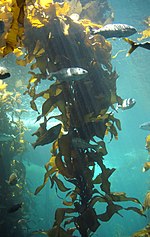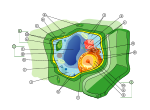Red algae, or Rhodophyta (/roʊˈdɒfɪtə/, /ˌroʊdəˈfaɪtə/; from Ancient Greek ῥόδον (rhódon) 'rose' and φυτόν (phutón) 'plant'), make up one of the oldest...
62 KB (6,198 words) - 12:04, 17 November 2024
divisions are: red algae (Rhodospermae), brown algae (Melanospermae), green algae (Chlorospermae), and Diatomaceae. At this time, microscopic algae were discovered...
92 KB (10,628 words) - 12:12, 19 November 2024
Harmful algal bloom (redirect from Harmful algae)
(HAB), or excessive algae growth, is an algal bloom that causes negative impacts to other organisms by production of natural algae-produced toxins, water...
164 KB (18,265 words) - 02:39, 24 October 2024
Coralline algae are red algae in the order Corallinales. They are characterized by a thallus that is hard because of calcareous deposits contained within...
33 KB (3,667 words) - 13:51, 24 October 2024
Brown algae (sg.: alga) are a large group of multicellular algae comprising the class Phaeophyceae. They include many seaweeds located in colder waters...
59 KB (5,869 words) - 02:48, 21 November 2024
Glaucophyte (redirect from Glaucophyte algæ)
the group varies from about 14 to 26. Together with the red algae (Rhodophyta) and the green algae plus land plants (Viridiplantae or Chloroplastida), they...
11 KB (1,011 words) - 19:29, 28 October 2024
Cyanobacteria (redirect from Blue-green algae)
photosynthesis is performed. Photoautotrophic eukaryotes such as red algae, green algae and plants perform photosynthesis in chlorophyllic organelles that...
180 KB (17,735 words) - 17:20, 13 November 2024
Edible seaweed (redirect from Culinary algae)
belong to one of several groups of multicellular algae: the red algae, green algae, and brown algae. Seaweeds are also harvested or cultivated for the...
30 KB (2,624 words) - 09:29, 11 November 2024
only known fish species to consume red algae, including ‘black brush’ or ‘beard’ algae. Closely related is the red algae-eater Crossocheilus langei, a species...
7 KB (746 words) - 10:44, 16 July 2024
also occurred in the red and brown algae). Diplobiontic green algae include isomorphic and heteromorphic forms. In isomorphic algae, the morphology is identical...
27 KB (2,663 words) - 17:15, 26 October 2024
Protists in the fossil record (section Red algae)
the diatoms, golden algae, haptophytes (coccoliths), silicoflagellates, tintinnids (ciliates), dinoflagellates, green algae, red algae, heliozoans, radiolarians...
70 KB (7,729 words) - 07:09, 4 January 2024
edible seaweed used in Japanese cuisine, usually made from species of the red algae genus Pyropia, including P. yezoensis and P. tenera. It has a strong and...
19 KB (2,105 words) - 12:20, 12 October 2024
Centroceras (alga) (category Red algae genera)
Centroceras is a genus of red algae belonging to the family Ceramiaceae. Species: Centroceras apiculatum Yamada Centroceras arcii C.W.Schneider, Cianciola...
910 bytes (41 words) - 01:08, 2 March 2022
Chloroplast (redirect from Red algal derived chloroplast)
membranes of the chloroplast. All secondary chloroplasts come from green and red algae. No secondary chloroplasts from glaucophytes have been observed, probably...
189 KB (19,143 words) - 04:06, 11 November 2024
Plastid (section In algae and protists)
1.5 billion years ago in the Archaeplastida clade—land plants, red algae, green algae and glaucophytes—probably with a cyanobiont, a symbiotic cyanobacteria...
29 KB (3,219 words) - 10:04, 11 October 2024
Polysiphonia (redirect from Red hair algae)
Polysiphonia, known as red hair algae, is a genus of filamentous red algae with about 19 species on the coasts of the British Isles and about 200 species...
19 KB (819 words) - 18:21, 29 August 2024
major group of eukaryotes, comprising the photoautotrophic red algae (Rhodophyta), green algae, land plants, and the minor group glaucophytes. It also includes...
42 KB (4,163 words) - 08:41, 23 November 2024
one of the only fish that will graze on "black brush algae" (freshwater Rhodophyta, or red algae), but even so will eat anything else in preference. Fishes...
10 KB (944 words) - 15:40, 22 September 2024
definition based on genomes includes the Viridiplantae, along with the red algae and the glaucophytes, in the clade Archaeplastida. There are about 380...
95 KB (8,067 words) - 16:08, 5 November 2024
six eukaryotic lineages: animals, symbiomycotan fungi, brown algae, red algae, green algae, and land plants. Eukaryotes are grouped by genomic similarities...
61 KB (6,101 words) - 07:05, 25 November 2024
Dinoflagellate (redirect from Dinoflagellate algæ)
derived from secondary endosymbiosis of red algae, however dinoflagellates with plastids derived from green algae and tertiary endosymbiosis of diatoms...
96 KB (10,337 words) - 09:25, 5 November 2024
Agar (category Red algae)
consisting of polysaccharides obtained from the cell walls of some species of red algae, primarily from "ogonori" (Gracilaria) and "tengusa" (Gelidiaceae). As...
36 KB (4,054 words) - 09:16, 28 October 2024
made of small cubes of agar jelly, a white translucent jelly made from red algae. The agar is dissolved with water (or fruit juice such as apple juice)...
2 KB (198 words) - 23:45, 21 March 2024
cultivated within algae scrubbers. Few algae, such as marimo or red moss, are sought after for aquascaping in freshwater aquaria. Green algae respond strongly...
14 KB (1,489 words) - 05:38, 18 November 2024
as Opisthosporidia) were studied as protists, and some algae (particularly red and green algae) remained classified as plants. According to the current...
140 KB (14,520 words) - 05:16, 25 November 2024
term life history is often used, particularly for organisms such as the red algae which have three multicellular stages (or more), rather than two. Life...
24 KB (2,972 words) - 00:46, 25 November 2024
Florideophyceae is a class of exclusively multicellular red algae. They were once thought to be the only algae to bear pit connections, but these have since been...
6 KB (482 words) - 02:10, 11 June 2024
Phycoerythrin (category Red algae)
Phycoerythrin (PE) is a red protein-pigment complex from the light-harvesting phycobiliprotein family, present in cyanobacteria, red algae and cryptophytes,...
22 KB (2,010 words) - 01:40, 8 November 2024
ancestor already possessed chloroplasts derived by endosymbiosis from red algae, all non-photosynthetic Chromista have secondarily lost the ability to...
26 KB (2,441 words) - 01:22, 10 October 2024



























